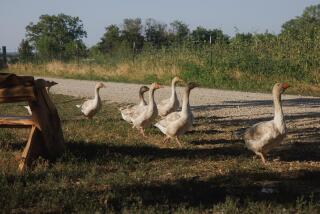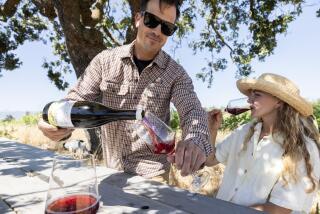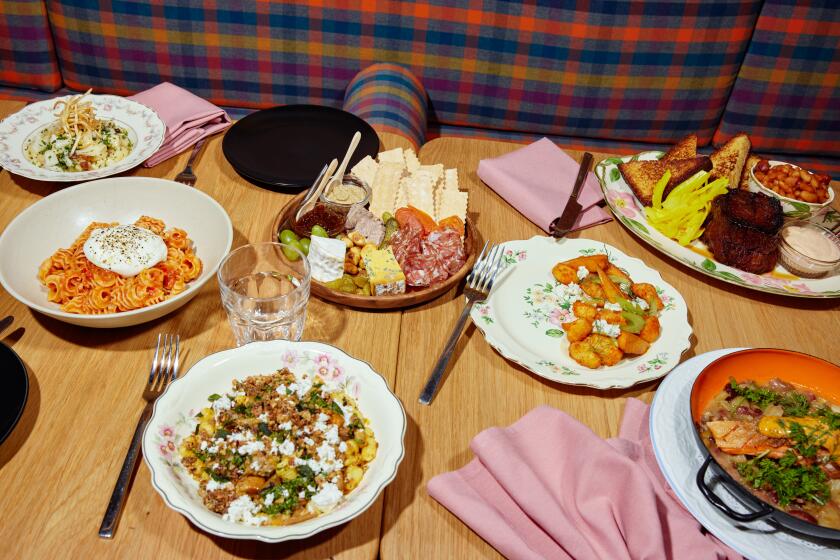‘Organic’ label doesn’t guarantee quality or taste
- Share via
I don’t believe in organic. There, I’ve said it and I feel better. It’s something that’s been on my mind for years.
Now, don’t get me wrong: I’ve got nothing against organic farmers. In fact, some of my favorite farmers are organic. I really admire them: Growing delicious food and doing it according to organic standards is adding a degree of difficulty that I wouldn’t wish on anyone.
But a lot of my favorite farmers aren’t organic, and therein lies the rub.
This may shock some people, and for that I guess I ought to apologize. But really, if I’m honest, I think the ones who need to do the apologizing are the often-well-meaning organic advocates who paint such a black-and-white picture of the way farming works that it seems there should be no choice at all.
Listening to them, you get the idea that if you aren’t eating fruits and vegetables that were organically grown, you might as well be mainlining Agent Orange or handing your money straight to some giant industrial agricultural corporation. You’re certainly not going to be getting anything with any flavor, they’d argue.
I’ve been covering agriculture and farmers markets for more than 20 years, and in that time, I’ve visited scores, if not hundreds, of farms, both conventional and organic. I wrote a book on the subject. And I can say with some degree of certainty that that those ideas are, at best, an oversimplification.
The real world isn’t black and white at all. Between pure organics and the reckless use of chemicals, there is a huge gray area, and this is where most farming is done.
Ignoring this means that not only are you being misinformed, but you’re also taking your eye off the real mission of supporting small farmers who grow wonderful food.
Whether something is grown organically might be one of the factors you use when you’re considering what to buy, but it is by no means the only one: For me, seasonality, locality and -- above all, flavor -- trump it.
And it certainly is not a surefire solution to all of life’s (or even agriculture’s) ills. You can be a bad farmer growing organically, and you can be a good farmer and still use chemical pesticides, herbicides and fertilizers.
In large part, this is a credit to the organic farming movement, as many of the ideas and techniques it pioneered have now worked their way into the mainstream, reducing the use of chemicals even among farmers who aren’t completely organic.
A positive influence
In fact, the sustainable agriculture movement recognizes this, claiming as one of its central tenets the much vaguer requirement of “environmental responsibility” and stating plainly that that doesn’t necessarily require growing strictly organically.
And as far as the image of organic farming being the domain of small family farms, for the most part, that is no truer than with conventional farms. A study by UC Santa Cruz professor Julie Guthman, included in her splendid book “Agrarian Dreams,” found that the sizes and ownerships of working organic and conventional fruit and vegetable farms are not that different.
That probably shouldn’t be that much of a surprise. Contrary to the image of farming being run by a few giant industrial agricultural corporations, roughly 85% of all farms in California -- organic or conventional -- are owned by individuals or families, and 75% are smaller than 100 acres. (On the other hand, Earthbound Farm, which grows organic lettuces and other vegetables, now cultivates more than 40,000 acres.)
The real problem with most farming today is with a commodity marketing system that demands that every decision be made based on what will be cheapest, not what will result in the best flavor. That -- not a simple choice between organic and conventional -- is what makes even small farms behave like industrial giants and ship fruits and vegetables that may look great but have no taste.
The similarities don’t end with size and ownership. While organic farming was once a broad philosophical concept that included such things as composting, fallowing land for a certain amount of time every year and even paying living wages to workers, today the difference between organic and conventional is defined almost entirely by the choice not to use certain chemicals.
Certainly, there is a problem with chemical pesticides, herbicides and fertilizers when they are used incorrectly. But it’s quite a leap to suggest that because something is harmful when misused, it mustn’t be used at all.
Making choices
The hard-line organic-or-nothing crowd refuses to recognize this. As a result, as with any other zero-tolerance program, that can lead to making some awfully dumb decisions.
Walking through the Santa Monica farmers market the other day, I again heard it repeatedly: Customers asking farmers “Are you organic?” as if it were some kind of litmus test for quality or safety. I saw somebody walk away from the absolutely heavenly Snow Queen white nectarines at Art Lange’s Honey Crisp stand because he doesn’t embrace the organic label.
This has happened so many times to Fitz Kelly, another terrific stone fruit grower at the Santa Monica market, that he has even printed up a fact sheet he routinely hands out explaining why he isn’t organic. Basically, it comes down to an orchard rooted in sandy, nutrient-poor soil that requires help from fertilizers; a preference for occasional, minimal sprayings of chemical pesticides rather than what he believes would be more frequent use of weaker, organically approved pesticides; not being willing to spend the time or the money that it takes to go through organic certification; and, truth be told, probably a good chunk of innate Irish stubbornness.
I’ve been to both of these farms and walked the orchards. You see all the right things: the mix of weeds growing between the trees (in order to attract the good bugs that will eat the bad bugs and reduce the need for spraying); the slight pallor of the leaves (too dark a green can mean overfertilizing); the healthy, diverse communities of birds and wildlife that make them home.
But most important, I’ve tasted the fruit that comes from them. Because if there’s one thing I’ve learned in more than 20 years of covering farming, it’s that you can’t fake flavor. You can fudge on almost everything else, but really delicious fruits and vegetables come only from talented, careful farmers doing their very best work.
And that’s true regardless of the label that’s attached.
More to Read
Eat your way across L.A.
Get our weekly Tasting Notes newsletter for reviews, news and more.
You may occasionally receive promotional content from the Los Angeles Times.











